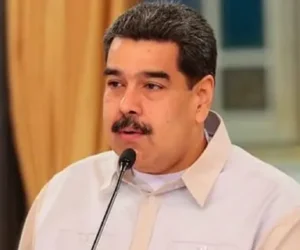Let me tell you something about Asari Dokubo that’ll probably surprise you – this man went from being Nigeria’s most wanted militant leader to becoming a traditional ruler recognized by a state government. That’s not just a career pivot. That’s a complete life transformation that reads like fiction but is absolutely real.
I’m going to walk you through the full story of how a judge’s son from Rivers State became a feared militant commander, converted to Islam, declared war on the Nigerian state, got arrested for treason, received amnesty, became a Benin Republic citizen, built schools abroad, and recently got crowned as a traditional ruler. If you think you know this story, trust me – there’s way more beneath the surface.
The Beginning: Melford Dokubo Goodhead Jr.
Asari Dokubo biography starts in 1964, specifically on June 1st, in Buguma, Rivers State, Nigeria. He was born as Melford Dokubo Goodhead Jr. into a respectable middle-class Christian family. His father was a court judge, his mother a housewife, and he had four siblings. This wasn’t a family of revolutionaries or militants – this was a comfortable, law-abiding, Christian household.
Think about that for a second. A judge’s son. Growing up with all the privileges that come with that – good education, social standing, expectations of following a respectable professional path. Everything pointed toward him becoming a lawyer, maybe a judge like his father, living a conventional successful Nigerian life.
But life had very different plans for young Melford.
He received both primary and secondary education in Port Harcourt, the capital of Rivers State. By all accounts, he was a bright student with potential. In fact, he was accepted into law school at the University of Calabar – continuing the family legal tradition seemed natural.
The University Years: Where Everything Changed
Here’s where the story takes its first major turn. Asari attended the University of Calabar’s law school, but he didn’t finish. After just three years, in 1990, he dropped out. His official reason? Problems with university authorities.
But there’s more to that story. This was 1990, during a turbulent period in Nigerian history. Student activism was intense. The Structural Adjustment Program riots had happened. Students across Nigeria were protesting economic policies, military rule, and state repression.
According to Asari himself in later interviews, a pivotal moment came during an anti-SAP demonstration at the University of Calabar. Police started shooting at protesting students. A female student named Nnenna, who was standing behind him, got shot. Asari, who was taller, somehow wasn’t hit, but the girl behind him was.
He carried her, covered in blood. She survived, but something changed in him that day. He started questioning everything – why was the state shooting students? What gave them the right? What were they doing with the people’s resources, especially the oil from his Niger Delta homeland?
From that moment, he decided the Nigerian state must be made to answer to the people, particularly to his Ijaw people. As a law student, he knew the principle: whoever owns the land owns everything in it. So why didn’t the Niger Delta people benefit from their own oil?
He tried continuing his education at Rivers State University of Science and Technology, but his growing activism made completion impossible. He dropped out again, this time for good. His father, the judge, must have been devastated.
The Conversion: From Melford to Mujahid
After dropping out of university, something dramatic happened. Melford Dokubo Goodhead Jr. converted to Islam and changed his name to Mujahid Dokubo-Asari. This wasn’t a casual change – this was a complete identity transformation.
According to his own account, he left home and went to Calabar Central Mosque, which was managed by some Yoruba Muslims, took the ritual bath, and became a Muslim. But here’s what’s crucial: he admits he became radicalized after converting to Islam.
In his words, “I became radicalised after I became a Muslim. One goal I set for myself was the liberation of my people and I wanted a military.”
Think about what he’s saying there. The conversion to Islam and his radicalization were connected. He wasn’t just seeking spiritual fulfillment – he was looking for a framework for revolutionary action. He wanted to build a military to liberate his people.
And his next move? He decided to go to Libya. Yes, Gaddafi’s Libya, known for training revolutionaries and militants from across Africa and the Middle East.
He took a bus from Calabar through Jos, Kafanchan, Zaria, Kano, Dutse, Damaturu, Maiduguri, crossing into Niger Republic, heading toward Libya. This wasn’t a tourist trip – this was a young man seeking military training to fight the Nigerian state.
That journey tells you everything about how serious he was. This wasn’t talk. This was action.
Political Activism: The Ijaw Youth Council Years
Before going full militant, Asari Dokubo tried conventional politics. In 1992 and 1998, he ran for political offices in Rivers State. Both times he lost. The political system wasn’t going to give him a platform.
But 1998 was a pivotal year. The Ijaw Youth Council (IYC) was formed by young Ijaw people frustrated with their marginalization in Nigeria’s oil-rich Niger Delta. Asari was a founding member and was appointed vice-president of the organization.
In November 1998, the IYC issued the Kaiama Declaration in a small town in Bayelsa State. This document was revolutionary. It expressed long-held Ijaw concerns about losing control of their homeland and their lives to the Nigerian state and oil companies. They called on oil companies to suspend operations and withdraw from Ijaw territory.
The declaration pledged to “struggle peacefully for freedom, self-determination and ecological justice.” Notice that word – “peacefully.” At this point, they were still pursuing non-violent resistance.
In 2001, Asari became president of the IYC. Under his leadership, the agenda became more radical: “Resource Control and Self-Determination By Every Means Necessary.” That phrase – “by every means necessary” – was significant. It meant violence wasn’t off the table anymore.
Ken Saro-Wiwa, the famous Ogoni activist who led peaceful protests, had been executed by the Abacha regime in 1995. That execution taught Asari and many others a harsh lesson: peaceful protest in Nigeria could get you killed without achieving your goals.
The Niger Delta People’s Volunteer Force: Going Full Militant
By 2004, Asari had retreated from public view. When he re-emerged, he had created something that would shake Nigeria’s oil industry to its core: the Niger Delta People’s Volunteer Force (NDPVF).
He named it after Isaac Boro’s 1960s Niger Delta Volunteer Force. Boro was an Ijaw revolutionary who declared the Niger Delta Republic independent from Nigeria in 1966. It lasted 12 days before being crushed. Asari called Boro his “role model” and decided to walk the path Boro had pioneered.
The NDPVF wasn’t just a protest group. This was a full-fledged militant organization, complete with weapons, speed boats, and a command structure. Where did they get weapons? According to Asari himself, “We are very close to international waters, and it’s very easy to get weapons from ships.”
Arms came from multiple sources: Nigerian soldiers returning from peacekeeping missions in Sierra Leone and Liberia, criminal syndicates in the delta, and shipping captains who paid armed groups with weapons in exchange for stolen oil.
By 2004 and 2005, Asari and his men were regularly seen cruising through the rivers and creeks of the delta in armadas of speed-boats with powerful outboard motors, armed with Kalashnikovs and rocket-propelled grenades. This wasn’t a ragtag militia – this was a serious armed force.
The NDPVF initially had political backing. Local and regional politicians funded them, seeing them as useful for controlling oil bunkering routes and territorial influence. But when Asari’s group became too radical and turned against their sponsors, those politicians withdrew support and funded a rival group instead.
The Oil War: Bringing Nigeria to Its Knees
Enter Ateke Tom and the Niger Delta Vigilantes (NDV). When Asari’s former political sponsors turned against him, they empowered Ateke Tom’s group to fight the NDPVF. What followed was full-scale war in the Niger Delta.
The two groups fought over territory and access to lucrative oil bunkering routes. Combat was concentrated in Warri and Port Harcourt, Nigeria’s oil capital. Both groups engaged in illegal oil tapping, stealing tens of thousands of barrels.
In September 2004, the NDPVF announced an “all-out war” against the Nigerian state. By late September, Asari issued an ultimatum to multinational energy companies: shut down operations by October 1st, or their employees would become targets in a major guerrilla operation called “Operation Locust Feast.”
The threats worked. Companies operating in the area withdrew most of their personnel from the delta. Oil production dropped by 30,000 barrels per day. Considering Nigeria’s dependence on oil revenue and the global oil market’s sensitivity to supply, this was massive. Petroleum prices worldwide increased significantly.
Think about what that means. A militant group led by a university dropout from Rivers State was affecting global oil prices. That’s how strategic the Niger Delta is and how effective Asari’s tactics were.
President Olusegun Obasanjo called Asari and Ateke Tom to Abuja for peace talks. The talks largely failed. Asari refused to endorse the legitimacy of Obasanjo’s government and publicly supported self-determination for the Ijaw people and independence for the Niger Delta.
Arrest, Treason Charges, and Prison
In September 2005, the inevitable happened. The Nigerian government arrested Asari and charged him with treason. This wasn’t a minor charge – treason in Nigeria can carry the death penalty.
He was detained while awaiting trial. But here’s what’s interesting: even from prison, Asari remained influential. His detention became a rallying point for various armed groups in the Niger Delta. They listed his release as one of their core grievances against the Nigerian state.
His arrest didn’t stop the militancy – it arguably intensified it. Other groups, seeing their leader imprisoned, escalated attacks on oil infrastructure. The Niger Delta was becoming increasingly ungovernable.
Asari spent nearly two years in detention facing treason charges that could have ended his life. But then came a change in government that would change his fate.
The Amnesty: From Most Wanted to Free Man
On June 14, 2007, newly-installed President Umaru Yar’Adua released Asari from prison. This was part of Yar’Adua’s broader strategy to pacify the Niger Delta and restore oil production.
But the real game-changer came later. Yar’Adua’s government introduced an amnesty program for Niger Delta militants. The deal was simple: surrender your weapons, renounce violence, and receive financial compensation and rehabilitation.
Asari and other militant leaders accepted the amnesty. The government paid them significant sums – critics called it a “bribe,” supporters called it “compensation for environmental damage and marginalization.”
According to various reports, Asari received substantial payments, reportedly in the millions of dollars, nominally for providing pipeline security and participating in the amnesty program. Critics questioned how a former militant who disrupted oil production was now being paid to protect it.
But from the government’s perspective, it made economic sense. Paying Asari and others a few million dollars was cheaper than losing billions in oil revenue to continued militancy.
The Benin Republic Move: Becoming an International Citizen
Here’s where Asari Dokubo biography takes an unexpected turn. In 2013, Asari renounced his Nigerian citizenship and became a citizen of Benin Republic.
Let that sink in for a moment. A man who fought for Ijaw rights and Niger Delta self-determination gave up his Nigerian citizenship. The irony is thick.
But his move to Benin Republic wasn’t just symbolic. He transferred his assets from Nigeria’s Niger Delta to Cotonou, where he built multiple schools, colleges, and even a university for students and schoolchildren.
Think about that transformation. The militant who once destroyed oil infrastructure was now building educational infrastructure in another country. The man who led armed struggles was investing in education.
His official Benin Republic citizenship came in 2014. Critics saw this as abandoning the struggle. Supporters saw it as strategic positioning – maintaining influence without being subject to Nigerian government pressure.
The Transformation: From Guns to Governance
Over the years, Asari Dokubo’s public persona shifted dramatically. The fiery militant commander became a businessman, entrepreneur, and political commentator.
He invested in multiple business ventures. His net worth is estimated between $1.5 million to $1.8 million, built through various business interests, government contracts for pipeline security, and his educational institutions in Benin Republic.
But his political positions also shifted in ways that confused and angered many of his former supporters. He became supportive of certain political figures, including President Muhammadu Buhari, despite Buhari’s military government being involved in Niger Delta repression in the 1980s.
His outspoken criticism of groups like the Indigenous People of Biafra (IPOB) and his attacks on their leader Nnamdi Kanu alienated many who saw him as hypocritical – he had once sought self-determination for his people but now opposed others seeking the same.
Yet he also formed the “Biafra de facto Customary Government” (BCG), positioning himself as an alternative to IPOB’s leadership. Critics called this opportunism. Asari called it pragmatism.
The Royal Coronation: From Militant to Monarch
And now, the latest chapter. On December 31, 2024, Rivers State Governor Siminalayi Fubara officially recognized Mujahid Asari Dokubo as the Amanyanabo (traditional ruler) of Torusarama Piri in Degema Local Government Area.
Read that again. The same government that once charged him with treason now recognizes him as a traditional ruler. The former militant is now royalty.
This coronation has sparked intense debate. Critics argue that rewarding a former militant with royal status sends the wrong message and undermines the radical ideals he once championed. They see it as the ultimate co-optation – the revolutionary absorbed into the establishment.
Supporters counter that traditional leadership allows Asari to advocate for Niger Delta development and education from a position of cultural authority and political influence.
His transformation is now complete: from Melford the judge’s son, to Mujahid the militant commander, to Alhaji the businessman, to Amanyanabo the traditional ruler.
The Family Life Behind the Headlines
Despite his very public life, Asari Dokubo has maintained some privacy around family. He’s been married multiple times. His first marriage was to Alhaja Zainab Asari Dokubo, who tragically died in a car accident in 2016 while traveling to Ibadan. That loss affected him deeply.
He’s currently married to Boma Dokubo, and he has multiple children including Amirah, Hassan, Hussain, and Osama. The choice of names reflects his Islamic identity – particularly naming a son Osama, which has obvious political implications given the name’s association with Osama bin Laden.
Despite his public controversies, those close to him describe Asari as a devoted family man who prioritizes his children’s well-being and education. His investment in schools in Benin Republic may partly be driven by wanting quality education accessible to his own children and his community.
Understanding His Continuing Contradictions
At 61 years old in 2025, Asari Dokubo remains one of the most controversial figures in Nigerian public life. And honestly, understanding him requires accepting contradictions:
He fought for Niger Delta self-determination but became a Benin Republic citizen.
He declared war on the Nigerian state but now accepts its recognition as a traditional ruler.
He criticized government corruption but accepted government money through the amnesty program.
He champions Ijaw rights but supports political figures from other ethnic groups who’ve been accused of marginalizing minorities.
He was a feared militant but is now invested in education and traditional governance.
These contradictions don’t necessarily make him a hypocrite. They might just make him human – someone who evolved, adapted, and changed as circumstances changed. Or maybe they do make him opportunistic. People disagree intensely on this.
The Legacy Question: Hero or Sellout?
So how should we understand Asari Dokubo’s legacy? That depends entirely on who you ask.
To his supporters, he’s:
- A hero who stood up to an oppressive state when nobody else would
- Someone who forced the Nigerian government to pay attention to Niger Delta grievances
- A pragmatist who transitioned from militancy to constructive engagement
- An investor in education and community development
- A symbol of Niger Delta resistance and Ijaw pride
To his critics, he’s:
- An opportunist who enriched himself through violence and then government payments
- A hypocrite who abandoned his revolutionary principles for comfort and status
- Someone who destabilized the region and contributed to ongoing violence
- A figure whose transformation into a traditional ruler represents co-optation by the same system he once fought
- Part of the problem rather than the solution
The truth, as always, is probably somewhere in between.
Asari certainly brought international attention to Niger Delta issues in ways peaceful protests never did. His militancy disrupted oil production enough to force the government to the negotiating table. The amnesty program, whatever its flaws, did reduce violence and create some economic opportunities.
But he also participated in and profited from the very oil theft he claimed to oppose. His militancy contributed to lawlessness that hurt ordinary Niger Delta residents. His transformation from militant to businessman to traditional ruler does raise questions about whether revolutionary ideals can survive engagement with power.
What His Story Teaches Us
Asari Dokubo biography is ultimately a story about the complexity of resistance, the seductions of power, and the difficulty of sustaining revolutionary commitment over decades.
It shows how easily revolutionary movements can be co-opted when governments have enough money to buy off leaders. It demonstrates how personal transformation – from Christianity to Islam, from law student to militant, from commander to king – can be both genuine and strategic simultaneously.
It reveals the moral ambiguities of armed struggle – is it justified when peaceful protest fails? At what point does necessary resistance become criminal violence? When does accepting compromise become necessary evolution versus selling out?
His journey from the creeks of the Niger Delta as a militant commander to the royal courts of Kalabari Kingdom as a traditional ruler represents something larger than one man’s life. It’s a parable about Nigeria itself – about how the system absorbs its rebels, how oil money corrupts resistance movements, how ethnicity and power intersect, and how yesterday’s enemies can become today’s allies.
The Bottom Line
Whether you see Asari Dokubo as a folk hero, a opportunist, a revolutionary, or a sellout probably depends on your own political views and what you value more – ideological purity or pragmatic results.
What’s undeniable is that his life has been extraordinary. From a judge’s son who had everything ahead of him to a university dropout who converted to Islam and built a militant army, from a treason defendant facing possible execution to a free man receiving government contracts, from a Nigerian who renounced his citizenship to a traditional ruler recognized by a Nigerian state government – this trajectory defies simple categorization.
At 61, his story is still being written. His role as a traditional ruler is new. How he uses this position – whether to genuinely advocate for development and justice or simply to enjoy status and influence – remains to be seen.
But one thing is certain: Asari Dokubo will remain one of the most controversial, complex, and ultimately fascinating figures in contemporary Nigerian history. Love him or hate him, you cannot ignore the mark he’s left on the Niger Delta, on Nigeria, and on the ongoing struggle over who controls Africa’s oil wealth and who benefits from it.








